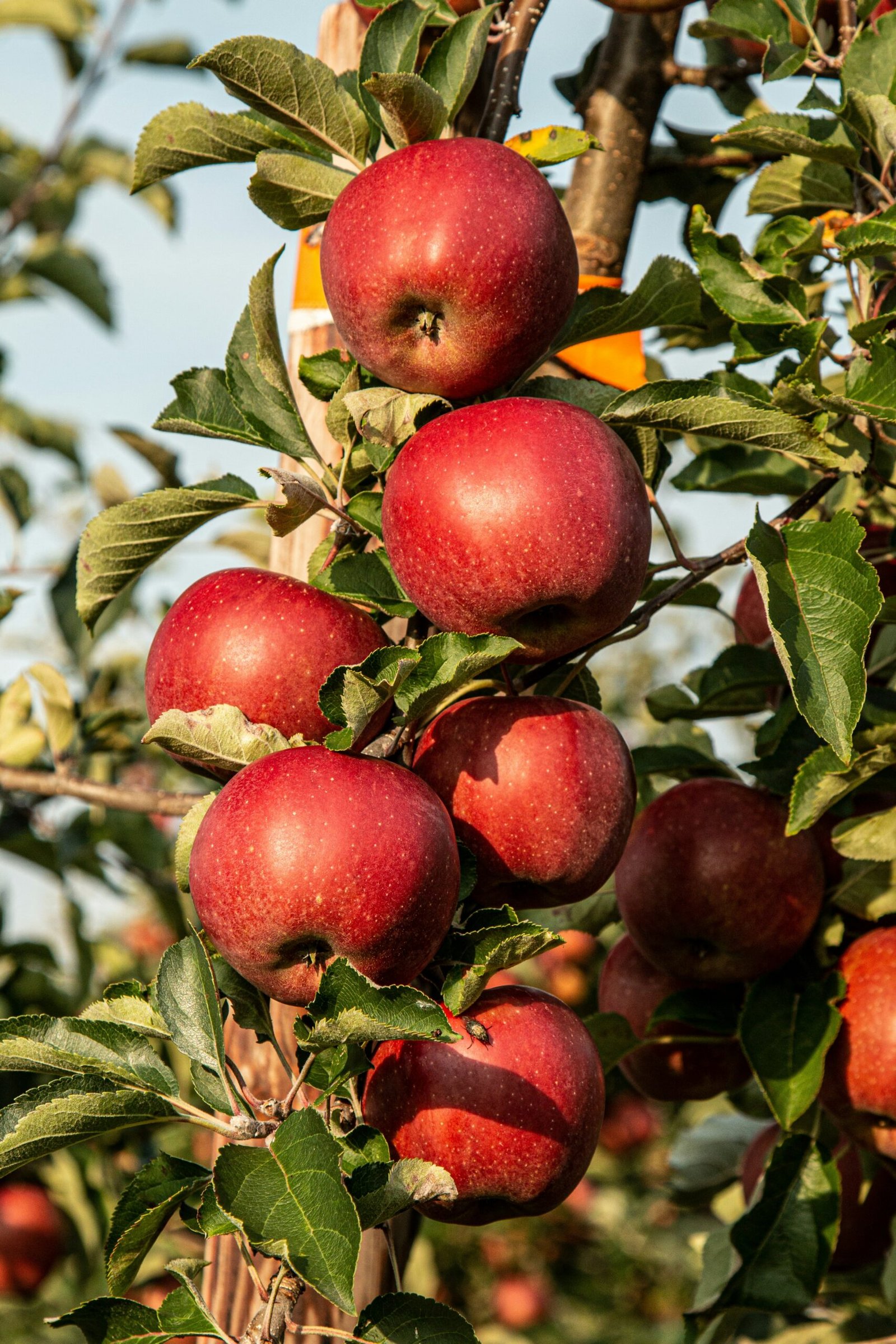One of the primary benefits of apple trees is their ability to produce a bountiful harvest of delicious and nutritious fruit. Apples are not only a popular snack but also a versatile ingredient in various culinary creations. From apple pies and tarts to applesauce and cider, the possibilities are endless when it comes to incorporating this flavorful fruit into your diet.
In addition to their culinary appeal, apple trees also offer environmental benefits. They are known for their ability to improve air quality by absorbing carbon dioxide and releasing oxygen through the process of photosynthesis. This makes them valuable contributors to reducing greenhouse gas emissions and combating climate change.
Furthermore, apple trees provide habitat and food for a wide range of wildlife. Birds, bees, and butterflies are attracted to the blossoms of apple trees, which provide nectar and pollen for their survival. The fruit itself serves as a food source for many animals, including squirrels and deer, contributing to the biodiversity of the surrounding ecosystem.
Apple trees also have aesthetic value, enhancing the beauty of any landscape. With their vibrant blossoms in the spring and colorful fruits in the fall, apple trees add visual interest and create a welcoming atmosphere. They can be planted as standalone trees or incorporated into orchards or gardens, adding a touch of natural elegance to the surroundings.
Moreover, growing apple trees can be a profitable venture. Commercial apple orchards can generate a significant income through the sale of fresh apples, apple products, and even agritourism activities such as apple picking and farm tours. For small-scale growers, having a few apple trees in the backyard can also provide a source of supplemental income by selling excess fruit at local farmers’ markets or to neighbors and friends.
Lastly, apple trees offer the opportunity for a rewarding and fulfilling hobby. Gardening enthusiasts can take pride in nurturing their apple trees and witnessing the fruits of their labor. The process of planting, pruning, and caring for apple trees can be a therapeutic and enjoyable experience, allowing individuals to connect with nature and find solace in the outdoors.
In conclusion, the benefits of apple trees are numerous and diverse. From the joy of harvesting fresh, delicious fruit to the positive impact on the environment and the potential for economic gain, apple trees are a wise investment for both individuals and communities. So, whether you are looking to enhance your garden, start an orchard, or simply enjoy the beauty and bounty of nature, consider planting apple trees and reap the rewards they offer.
1. Fresh and Nutritious Fruit
One of the most obvious benefits of apple trees is the abundance of fresh and nutritious fruit they produce. Apples are not only delicious but also packed with essential vitamins, minerals, and dietary fiber. They are a great source of antioxidants, which can help boost your immune system and protect your body against various diseases. By growing your own apple trees, you can have access to organic, pesticide-free fruit right in your backyard.
When you pick an apple from your own tree, you can be confident that it is at the peak of freshness. Unlike store-bought apples that may have been picked weeks ago and traveled long distances, homegrown apples are harvested at the perfect time for optimal flavor and nutritional value. The crispness and juiciness of a freshly picked apple cannot be matched by any store-bought variety.
Furthermore, growing your own apple trees allows you to have control over the cultivation process. You can choose to grow your apples organically, without the use of harmful pesticides or chemicals. This ensures that the fruit you consume is free from any potentially harmful residues and is truly wholesome.
Another advantage of having your own apple trees is the variety of apple cultivars you can choose from. Supermarkets typically offer a limited selection of apple varieties, but when you grow your own trees, you have the freedom to choose from a wide range of flavors, textures, and colors. Whether you prefer sweet and crisp apples like Honeycrisp or tart and tangy ones like Granny Smith, you can tailor your apple orchard to suit your taste preferences.
In addition to the nutritional benefits, growing apple trees can also be a rewarding and enjoyable hobby. Watching your trees blossom in the spring, seeing the tiny fruits develop, and finally harvesting the ripe apples in the fall can bring a sense of satisfaction and accomplishment. It is a process that allows you to connect with nature, learn about the lifecycle of trees, and appreciate the beauty of the changing seasons.
Moreover, having an apple tree in your backyard can create a sense of self-sufficiency and sustainability. Instead of relying solely on store-bought produce, you can rely on your own trees to provide you with a fresh and healthy snack. This can be particularly beneficial for those who are conscious of their environmental impact and want to reduce their carbon footprint.
In conclusion, growing your own apple trees offers a multitude of benefits. From the abundance of fresh and nutritious fruit to the satisfaction of cultivating your own food, apple trees can enhance your overall well-being and connection to nature. So why not consider planting an apple tree in your backyard and enjoy the many rewards it brings?
Not only do apple trees provide delicious fruit and contribute to the ecosystem, but they also have a significant aesthetic appeal. The beauty of apple trees lies not only in their blossoms and foliage but also in their overall shape and structure. With their graceful branches reaching towards the sky, apple trees can serve as focal points in any garden or landscape.
One of the most captivating sights is the blooming of apple trees in spring. As the weather warms up and the days grow longer, apple trees burst into a riot of colors, with delicate pink and white blossoms covering their branches. The sight of these blossoms is not only visually stunning but also symbolic of the arrival of a new season and the promise of fresh beginnings.
As the seasons change, apple trees continue to captivate with their vibrant foliage in autumn. The leaves of apple trees turn shades of red, orange, and yellow, creating a breathtaking display of colors. This natural spectacle can transform any garden into a picturesque scene, reminiscent of a painting.
Furthermore, the beauty of apple trees extends beyond their visual appeal. These trees have the ability to attract various wildlife, further enhancing the overall aesthetic of your garden. The sweet scent of apple blossoms acts as a magnet for bees and butterflies, who visit the flowers for nectar and pollen. The fluttering of butterflies and the buzzing of bees around the apple trees bring an element of life and movement to the landscape.
Moreover, apple trees can also attract a wide variety of birds. The branches provide perches for birds to rest and observe their surroundings, while the fruits serve as a valuable food source. The presence of birds adds a delightful touch to the garden, with their melodious songs and colorful plumage.
In conclusion, apple trees offer not only delicious fruit but also a feast for the senses. Their beautiful blossoms and vibrant foliage create a visually stunning landscape, while their ability to attract birds and butterflies adds an element of biodiversity and liveliness. Whether you have a small backyard or a large orchard, planting apple trees can bring natural beauty and aesthetic appeal to any space.
3. Environmental Benefits
Growing apple trees can have several positive environmental impacts. Firstly, trees in general help to improve air quality by absorbing carbon dioxide and releasing oxygen through the process of photosynthesis. This natural process is crucial in mitigating climate change as it helps to reduce the amount of greenhouse gases in the atmosphere. Apple trees, with their large canopies, can provide significant shade, reducing the need for air conditioning during hot summer months. By reducing energy consumption, apple orchards contribute to the reduction of greenhouse gas emissions associated with the production of electricity.
Furthermore, apple orchards can serve as habitats for various wildlife, contributing to the preservation of biodiversity. The trees provide shelter, nesting sites, and food sources for a wide range of species, including birds, insects, and small mammals. This diversity of wildlife helps to maintain a balanced ecosystem and promotes natural pest control. For example, birds that make their homes in apple orchards often feed on insects that could potentially harm the apple trees, reducing the need for pesticides.
In addition to supporting wildlife, apple orchards can also help to protect soil health. The extensive root systems of apple trees help to prevent soil erosion by anchoring the soil and reducing the impact of heavy rainfall. The fallen leaves and organic matter from the trees contribute to the nutrient content of the soil, enhancing its fertility and promoting the growth of other plants in the area.
Moreover, apple orchards can play a role in water conservation. The trees’ deep root systems help to improve water infiltration and reduce runoff, allowing the soil to retain more water. This can be particularly beneficial in regions prone to drought, as apple orchards can help to maintain groundwater levels and reduce the strain on local water resources.
In summary, growing apple trees not only provides us with delicious fruits but also brings numerous environmental benefits. From improving air quality and reducing energy consumption to supporting biodiversity and protecting soil health, apple orchards have a positive impact on the environment. By recognizing and promoting the importance of sustainable agricultural practices, we can further enhance these benefits and create a healthier and more sustainable future.
4. Economic Opportunities
Apple trees can offer various economic opportunities, especially for those interested in commercial fruit production. Apple orchards can be a profitable venture, providing a consistent source of income through the sale of apples, apple products, and even agritourism activities such as apple picking and farm tours. Additionally, the demand for organic and locally grown produce is on the rise, presenting an opportunity for farmers to tap into this market and command premium prices for their apples.
Furthermore, the educational value of apple trees extends beyond just the science of plant life. They can also be used as a platform for teaching various subjects such as history, literature, and art. For example, studying the history of apple cultivation can provide insights into the development of agriculture and the impact of different apple varieties on different cultures throughout time.
In literature, apple trees have been used as symbols of knowledge, temptation, and even immortality. The biblical story of Adam and Eve in the Garden of Eden, where the forbidden fruit is often depicted as an apple, is one such example. Exploring these literary references can spark discussions about symbolism and interpretation.
Additionally, apple trees can inspire artistic expression. The beauty of their blossoms in the spring, the vibrant colors of their fruits in the fall, and the peacefulness they bring to a garden can all serve as inspiration for painters, photographers, and poets. By incorporating apple trees into art classes or creative writing workshops, students can explore different mediums and techniques while connecting with nature.
Moreover, apple trees can be used as a tool for teaching environmental stewardship and sustainable practices. By learning about the importance of pollinators and the role they play in apple tree pollination, students can gain a deeper understanding of the delicate balance of ecosystems. They can also learn about organic gardening methods, composting, and water conservation techniques, which are all essential for maintaining the health of apple trees and the environment as a whole.
In conclusion, the educational value of apple trees is vast and multifaceted. They provide opportunities for learning about science, history, literature, art, and environmental sustainability. By incorporating apple trees into educational settings, we can foster a deeper connection with nature, promote critical thinking skills, and instill a sense of responsibility towards the environment.

